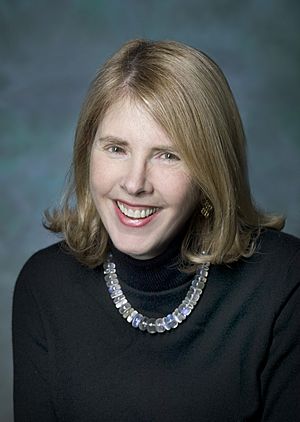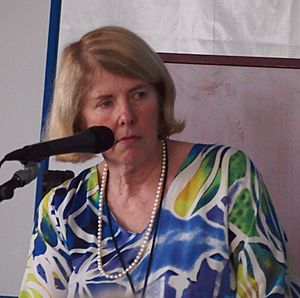Kay Redfield Jamison facts for kids
Quick facts for kids
Kay Redfield Jamison
|
|
|---|---|

Kay Redfield Jamison in 2007
|
|
| Born | June 22, 1946 |
| Academic background | |
| Alma mater | University of California, Los Angeles |
| Academic work | |
| Institutions | Johns Hopkins School of Medicine University of St Andrews |
| Main interests | Psychiatry |
| Notable works | An Unquiet Mind |
Kay Redfield Jamison (born June 22, 1946) is an American clinical psychologist and writer. She is a leading expert on bipolar disorder, a condition that causes extreme mood swings. Jamison has studied this condition for many years and has also shared her own personal experience of living with it since she was a young adult.
She is a professor at the Johns Hopkins University School of Medicine and also an Honorary Professor of English at the University of St Andrews in Scotland.
Contents
Education and Career
Kay Redfield Jamison started studying clinical psychology at the University of California, Los Angeles (UCLA) in the late 1960s. She earned her bachelor's and master's degrees in 1971. She continued her studies at UCLA and earned her PhD, which is the highest degree for a subject, in 1975.
After graduating, she became a professor at UCLA. There, she started the Affective Disorders Clinic. This clinic helped people with mood disorders and also trained new doctors and researchers.
Later, Jamison became a professor of psychiatry at the Johns Hopkins University School of Medicine. She has given lectures at many famous universities, including Harvard University and the University of Oxford.
Awards and Recognition
Jamison has received many awards for her work. She has published over 100 academic articles. Time magazine named her a "Hero of Medicine." She was also featured in a TV series called Great Minds of Medicine.
Some of her major awards include:
- The William Styron Award in 1995
- The American Foundation for Suicide Prevention Research Award in 1996
- A MacArthur Fellowship (often called a "genius grant") in 2001
In 2010, the University of St Andrews gave her an honorary degree to recognize her life's work. In 2017, she was elected as a Corresponding Fellow of the Royal Society of Edinburgh, a high honor for scientists and scholars.
Important Books and Ideas
Jamison has written several important books that have helped both doctors and the public understand mental health better.
An Unquiet Mind
Her most famous book is her memoir, An Unquiet Mind. In this book, she bravely shares her own story of living with bipolar disorder. She describes her experiences with the highs (mania) and lows (depression) of the condition. She wrote it to help doctors understand what it's like to be a patient and what kind of support is most helpful.
Other Major Works
- Manic-Depressive Illness: Co-written with Dr. Frederick K. Goodwin, this book is a classic textbook for doctors and students studying bipolar disorder.
- Touched with Fire: In this book, Jamison explores the link between bipolar disorder and creativity. She looks at famous artists and writers, like the poet Lord Byron, who may have had the condition.
- Exuberance: The Passion for Life: This book looks at the positive side of high energy and enthusiasm. She suggests that some people, like President Theodore Roosevelt, had a natural energy that helped them achieve great things.
- Robert Lowell: Setting the River on Fire: This biography of the poet Robert Lowell was a finalist for the Pulitzer Prize in 2018.
Personal Life
Jamison's father was an officer in the U.S. Air Force, so her family moved around a lot when she was a child. She lived in places like Florida, Puerto Rico, Tokyo, and Washington, D.C. Her interest in science and medicine started when she was young.
During her late teens, Jamison began experiencing the challenges of bipolar disorder. Even while studying psychology in college, she didn't realize she had the condition herself until after she became a professor at UCLA.
After her diagnosis, she began treatment, which included the medication lithium, to help manage her moods. Learning to live with her condition was a long journey. At one point, she experienced a severe depressive episode that was very difficult. Her experiences have given her a deep understanding of mental illness, which she uses to help others.
In her book An Unquiet Mind, she wrote that life is full of ups and downs. She believes these challenging and exciting moments are what shape a person's life, work, and relationships.
Jamison has been married three times. Her second husband, Dr. Richard Wyatt, was a psychiatrist who studied schizophrenia. She wrote about their relationship in her memoir Nothing Was the Same. In 2010, she married Thomas Traill, a professor of cardiology at Johns Hopkins.


